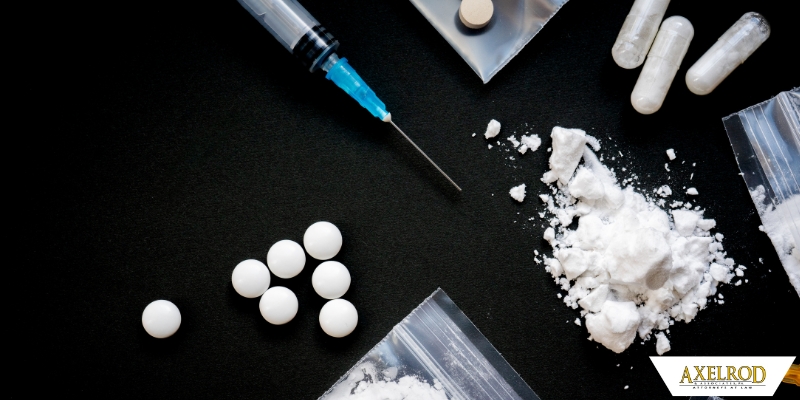4701 Oleander Drive, Suite A
Myrtle Beach, SC 29577
4701 Oleander Drive, Suite A
Myrtle Beach, SC 29577
Myrtle Beach Drug Crime Lawyer
Drug Crimes Attorneys in Myrtle Beach, SC
Although some states allow medical and recreational use of certain drugs, South Carolina is not among them. Here, drug laws are strict, and a conviction can result in serious criminal law consequences. It is important to understand SC drug laws to avoid being convicted of serious drug offenses.
Drug trafficking, possession, and drug use can all trigger police involvement and legal consequences. If you have been arrested for or accused of drug crimes, it is essential that you hire a criminal defense attorney right away. Our team at Axelrod & Associates is here to help you during this time. We can help you to fight your case and maintain your innocence in South Carolina court.
Experienced Myrtle Beach, SC Drug Crime Defense Lawyer
The drug crimes defense lawyers at Axelrod & Associates have extensive experience defending clients against simple possession charges, possession with intent to distribute (PWID) charges, drug manufacturing charges, drug distribution charges, and drug trafficking charges for most types of drugs, including:
- Marijuana,
- Cocaine,
- Heroin,
- Methamphetamines,
- Prescription drugs like oxycodone, and
- Ecstasy, mushrooms, LSD, or other hallucinogens.
If you have been charged with a drug crime in SC, there may be hope. You may have defenses that you are unaware of, key evidence may be suppressed in your case, you may have pretrial options that will allow you to avoid a conviction, or you may have options that allow you to stay out of jail, depending on the facts of your case.

What Can Your Drug Crimes Defense Lawyer Do For You?
Your drug crimes defense lawyer on the Axelrod team will meet with you, investigate your case, get all evidence that the State intends to use against you, and research the law as applied to your case.
Your attorney will gather all available evidence and witnesses that we may need to 1) file motions to dismiss or to suppress the evidence in your case based on constitutional violations, 2) get your case dismissed before trial, or 3) try your case to a jury when necessary.
Drug Offenses in SC: Simple Possession, PWID, Distribution, Manufacturing, and Trafficking
Some drug offenses in SC are based on possession – whether it is simple possession, possession with intent to distribute, or drug trafficking, the State must prove that you possessed the drugs (either “actual possession” or “constructive possession”).
The “level” of the offense – simple possession, PWID, or trafficking – is then based on the weight of the drugs found.
Other drug offenses, like distribution or manufacturing, require proof of different elements. Below, we will look at the most common drug offenses, what the State must prove to get a conviction, and the potential penalties.
Simple Possession
“Simple” possession means the lowest level of drug possession and is based on the weight of the drugs found. When you have a small amount of drugs in your possession, the law can assume that you do not intend to sell or distribute them.
For example:
| Drug | Weight | Offense |
| Marijuana | One ounce or less | Simple possession |
| Hashish | Ten grams or less | Simple possession |
| Cocaine, crack cocaine, or methamphetamine | Less than one gram | Simple possession |
| Heroin or fentanyl | Four grains or less (grains, not grams) | Simple possession |
Simple possession is often charged as a misdemeanor. Although misdemeanors are still serious, they carry significantly lighter punishments than felony offenses.
Possession With Intent To Distribute
Possession with intent to distribute is often charged when the weight of the drugs exceeds the “threshold amount” under SC law, but that is not enough for a PWID conviction.
The State must prove that the defendant intended to distribute the drugs in question. The weight of the drugs may create a rebuttable inference that the defendant intended to distribute them, but a jury may find the defendant guilty of the lesser included offense of possession when the State does not have additional evidence of intent to distribute like:
- Witness testimony or incriminating statements by the defendant,
- Paraphernalia used for distribution like baggies, scales, or ledgers, or
- Drugs that are packaged for individual resale (lots of little baggies instead of one large package).
The current threshold amounts that create an inference of possession with intent to distribute include:
| Drug | Weight | Offense |
| Marijuana | More than one ounce, less than ten pounds | PWID |
| Hashish | More than ten grams | PWID |
| Cocaine, crack cocaine, or methamphetamine | More than one gram, less than ten grams | PWID |
| Heroin or fentanyl | More than four grains, less than four grams | PWID |
Drug possession with intent to distribute is always charged as a felony, which carries significant punishments and long-term consequences.
Drug Manufacturing
Although drug manufacturing charges can apply to any type of controlled substance, the most common are manufacturing marijuana (growing marijuana, whether it is outdoors or in a grow room or tent) and manufacturing meth.
Charges for manufacturing meth require the State to prove that you had a sufficient number of “precursors” to make the product, and they may be accompanied by other related charges like exposing children to meth operations or disposal of waste from meth production.
Drug Distribution
Although drug distribution charges can be based on any transfer of a controlled substance, whether you are giving it away, sharing it, or selling it, they usually arise from one or more “controlled buys” conducted by law enforcement with help from informants.
The most common type of “drug sting” involves an informant – often someone who is facing their own charges and is hoping for help on their sentence – who make a drug buy at the direction of law enforcement.
They are usually wired for video or sound, given marked bills with which to make the buy, sent to make the purchase as agents wait somewhere nearby, and searched before and after the buy.
Law enforcement will often make two or more controlled buys before they seek an arrest warrant and a search warrant for the location of the buys, and there are often additional charges based on the drugs found during the arrest and search of the location.
Drug Trafficking
Drug trafficking charges in SC can be based on possession (actual or constructive) or conspiracy.
The most common basis for trafficking charges is possession of drugs where the weight exceeds the threshold weight. For example:
- Drug Weight Offense
- Marijuana Ten pounds or more Trafficking
- Cocaine, crack cocaine, or methamphetamine Ten grams or more Trafficking
- Heroin or fentanyl Four grams or more Trafficking
Drug trafficking is a graduated offense – the penalties increase as the weight of the drugs found increases, up to as much as 40 years in prison for a second offense trafficking 28 grams or more of heroin or fentanyl.
Drug Crimes Defenses in South Carolina
The potential defenses to any drug crime in SC will vary based on the nature of the charge and the facts of your case, but some of the more common defenses include:
- Mistaken identity,
- Fourth Amendment or other constitutional violations committed by the officer
- Insufficient evidence – for example, when the informant in a drug investigation is not available to testify at trial
- Constructive possession – the state does not prove that you had 1) the power to control the disposition of the drugs or 2) the intent to control the disposition of the drugs (knowledge)
In many cases, pretrial diversion programs are available like Pretrial Intervention (PTI), Drug Court, or a conditional discharge.
FAQs About South Carolina Drug Crimes Law
What is PWID in South Carolina?
PWID stands for “possession with intent to distribute.” This means that you not only have drugs in your possession, but you also have the intention of giving them away or selling them to others. The law determines intent by the volume of drugs that you have in your possession. If you exceed the weight limit for a certain drug, the law assumes that you cannot be using the drug only for yourself and that you must be distributing it in some way.
Is Possession of Drugs a Felony in SC?
Generally, yes. Simple possession of drugs is the lightest drug crime, and the punishment will depend upon the type of drug and the amount in your possession. A small amount that is clearly for personal use will yield the lightest charges. The first offense will sometimes be prosecuted as a misdemeanor, but subsequent arrests will be considered felonies. Possession with intent to distribute (PWID) carries more severe punishments and is always prosecuted as a felony. Usually, a case is labeled with “intent to distribute” once it passes certain weight limitations. The punishments for these depend upon the weight and type of the drug as well.
Are Drugs Legal in South Carolina?
Some drugs, such as those prescribed by physicians, are legal in South Carolina. However, non-prescription drugs are illegal. Marijuana, cocaine, heroin, non-prescribed fentanyl, methamphetamines, hallucinogens, and other similar drugs are still illegal, whether you simply have some in your possession or are making or distributing them. It is important to understand that, although marijuana is legal in some states, it is currently not legal for medical or recreational use in South Carolina.
Is Possession With Intent to Distribute a Felony in South Carolina?
Yes. Possession with intent to distribute (PWID) is always considered a felony in South Carolina. This applies no matter the type of drug in your possession. PWID charges occur when you have more than a certain weight of a drug in your possession. If you are under this threshold, you will be charged with possession, which is generally a misdemeanor rather than a felony.
GOT AXELROD?
Your drug crimes defense lawyer at Axelrod & Associates knows the local courts, attorneys, prosecutors, officers, criminal procedures, and criminal laws, and has access to investigators and experts to assist with any issue that may arise in your case.
We have experience with drug prosecutions at all levels of the court system in SC, including jury trials, post-conviction relief (PCR) proceedings, and appeals.
If you have been charged with a drug crime in SC or believe that you are under investigation, call 843-353-3449 now or complete our contact form to set up a free initial consultation.
Need help? Contact Axelrod & Associates, P.A.

Request your
Consultation
The fields marked with * are mandatory.






